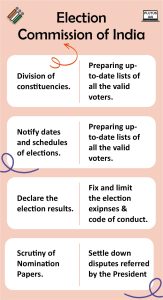14 Dec Appointment of Election Commissioners in India
This article covers “Daily Current Affairs” and the topic details “ Appointment Election Commissioners in India”. This topic has relevance in the Polity and Governance section of the UPSC CSE exam.
GS 2: Polity and Governance
Why in the news?
The Rajya Sabha has approved legislation aimed at overseeing the appointment process of the Election Commission of India. This bill ensures that the status of the Chief Election Commissioner (CEC) and two Election Commissioners (ECs) remains equivalent to that of Supreme Court judges. In contrast, the preceding bill had intended to diminish their service conditions by bringing them in line with those of a Cabinet Secretary.
Background:
On August 10, the Chief Election Commissioner and other Election Commissioners (Appointment, Conditions of Service and Term of Office) Bill, 2023, was introduced in the Rajya Sabha, attempting to modify constitutional provisions governing the Election Commission (EC). The bill, seeking to align EC members’ service conditions with those of a Cabinet Secretary, faced criticism for downgrading their status equivalent to Supreme Court judges.
Reintroduction and Key Amendments:
The Bill resurfaced in the Rajya Sabha on December 12, accompanied by significant amendments aiming to restore the status of EC members. These amendments aimed to maintain the CEC and two ECs on par with judges of the Supreme Court.
Key Highlights of the Bill:
- Panel Composition Changes:
-
-
- Removes the Chief Justice of India (CJI) from the selection committee, replacing them with a Cabinet Minister nominated by the Prime Minister.
- Includes the Leader of the Opposition in the Lok Sabha as a committee member.
-
- Selection Criteria:
-
-
- Requires EC members to have held a post equivalent to Secretary to the Government of India.
- Emphasizes integrity, knowledge, and experience in the management and conduct of elections.
-
- Selection Process:
-
-
- Involves a Search Committee headed by the Law Minister proposing a panel of names to the selection committee.
- The Selection Committee, chaired by the PM, includes the Leader of the Opposition and a Cabinet Minister nominated by the Prime Minister.
- Allows the consideration of candidates outside the Search Committee’s panel.
-
- Terms and Tenure:
-
-
- Maintains the CEC and ECs’ terms at six years or until the age of 65, with salaries equivalent to Supreme Court judges.
-
- Repeal of Act:
-
-
- Repeals the Election Commission (Conditions of Service of Election Commissioners and Transaction of Business) Act, 1991.
-
- Removal Procedure:
-
-
- Aligns CEC’s removal with that of an SC judge; election commissioners can only be removed based on the CEC’s recommendation.
-
- Legal Protection:
-
-
- Introduces a provision protecting current and former CECs and election commissioners from civil or criminal proceedings related to their official duties.
-
Criticism:
Some Opposition leaders criticize the Bill for replacing the CJI in the selection committee with a Cabinet Minister, raising concerns about the potential for the government to dominate candidate selection.
About Election Commission of India
The Election Commission of India, a permanent and independent body, is empowered by Article 324 of the Constitution to conduct elections for Parliament, State Legislatures, and the offices of the President and Vice-President.
Appointment and Tenure:
- Legislative Framework:
-
-
- Article 324(2) grants the power of appointing the Chief Election Commissioner (CEC) and Election Commissioners (ECs) to the President, subject to any law framed by Parliament.
- No specific legislation has been enacted for this purpose.
-
- Current Appointment Process:
-
-
- The President appoints CEC and ECs based on the advice of the Union Council of Ministers, led by the Prime Minister.
- They serve a term of six years or until the age of 65, receiving the same status, salary, and perks as Judges of the Supreme Court.
-
- Removal Process:
-
-
- The CEC can only be removed in the same manner and on the same grounds as a judge of the Supreme Court.
- Retiring Election Commissioners are not barred from further government appointments.
-

Supreme Court’s Intervention:
- Constitutional Bench Ruling:
-
-
- A five-judge Constitution Bench of the Supreme Court addressed petitions advocating a selection process akin to the CBI Director’s appointment.
-
- Disapproval of Current System:
-
-
- In March 2023, the Supreme Court unanimously disapproved of the existing system where the Centre appoints members of the Election Commission.
-
- Call for Legislative Action:
-
-
- Pointing to Article 324(2), the Court urged Parliament to enact a law specifying criteria for selection, service conditions, and tenure of the CEC and ECs.
-
- Interim Panel Appointment:
-
-
- Until a law is enacted, the apex court established an interim panel consisting of the Prime Minister, Chief Justice of India, and the Leader of the Opposition for making these appointments.
-
Download plutus ias current affairs eng med 14th Dec 2023
Q.1 With reference to Election Commission, consider the following statements:
- The Chief Election Commissioner has overriding powers over other Election Commissioners
- Election Commission is a Constitutional Body under Article 213 of the Constitution
- Election Commission also conducts the election of Panchayats under its mandate
How many of the above statement/s is/are correct?
(a) Only one
(b) Only two
(c) All three
(d) None
ANSWER: D
Q.2 Evaluate the Significance of the Election Commission of India (ECI) in Safeguarding Democratic Values.



No Comments